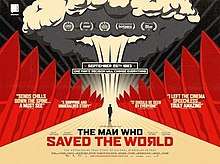The Man Who Saved the World
The Man Who Saved the World is a 2013 feature-length Danish documentary film by film maker Peter Anthony about Stanislav Petrov, a former lieutenant colonel of the Soviet Air Defence Forces and his role in preventing the 1983 Soviet nuclear false alarm incident from leading to nuclear holocaust.
| The Man Who Saved the World | |
|---|---|
 Cinema poster | |
| Directed by | Peter Anthony |
| Produced by | Jakob Staberg |
| Written by | Peter Anthony |
| Starring | Stanislav Petrov Sergey Shnyryov Kevin Costner |
| Music by | Kristian Eidnes Andersen |
| Cinematography | Kim Hattesen Anders Löfstedt |
| Edited by | Morten Højbjerg |
Production company |
|
Release date | |
| Country | Denmark |
| Language | English and Russian |
The film premiered in October 2014 at the Woodstock Film Festival in Woodstock, New York, winning; "Honorable Mention: Audience Award Winner for Best Narrative Feature" and "Honorable Mention: James Lyons Award for Best Editing of a Narrative Feature."[3] On February 22, 2018 the film premiered in Russia at the Documentary Film Center in Moscow.
Synopsis
On 26 September 1983, the computers in the Serpukhov-15 bunker outside Moscow, which housed the command centre of the Soviet early warning satellite system, twice reported that U.S. intercontinental ballistic missiles were heading toward the Soviet Union. Stanislav Petrov, who was duty officer that night, suspected that the system was malfunctioning and managed to convince his superiors of the same thing. He argued that if the U.S. was going to attack pre-emptively it would do so with more than just five missiles, and that it was best to wait for ground radar confirmation before launching a counter-attack.
Production notes
In the film, footage of Petrov today is intertwined with re-enactments of the dramatic moments in 1983. Sergey Shnyryov plays Petrov in the re-enactments.[4]
Peter Anthony made the film over a decade; the process was difficult because of Petrov's reluctance to open up. Anthony said: "He is quite difficult to work with, as in his day, you could still go to the gulag for disclosing unauthorised information, and as an ex-soldier, he wasn't really interested in discussing his personal feelings. That though, is the beauty of the story."[5]
Awards
2013
Hot Docs Canadian International Documentary Festival
- Nominated, Best International Documentary
2014
CPH:DOX
- Nominated, Politiken's Audience Award
- Nominated, Nordic Dox Award
Woodstock Film Festival
- Won, Honorable Mention: Audience Award for Best Narrative Feature
- Won, Honorable Mention: James Lyons Award for Best Editing of a Narrative Feature
- Nominated, Jury Prize: Best Narrative Feature
2015
Nordisk Panorama
- Nominated, Nordic Documentary Film Award
Sunscreen Film Festival, US
- Won, Festival Prize: Best Feature Film
2016
Robert Festival / Danish Film Academy Award
- Won, Robert: Best Documentary (Årets dokumentarfilm)
- Nominated, Robert: Best Original Score (Årets score)
- Nominated, Audience Award
Bodil Awards / Danish Film Critics Award
- Won, Bodil: Best Documentary (Bedste dokumentarfilm)
See also
- Vasily Arkhipov, a Soviet Naval officer who refused to launch a nuclear torpedo during the 1962 Cuban Missile Crisis
- List of nuclear close calls
References
- https://variety.com/2013/film/global/kinosmith-kicks-off-hot-docs-sales-1200414168/
- https://canada.um.dk/en/about-us/news-from-the-embassy/newsdisplaypage/?newsid=efc3a5bd-6e9e-4451-848a-2cc3ac660388
- "2014 Woodstock Film Festival Honors Darren Aronofsky, Announces Audience Awards". Indiewire. 21 October 2014. Retrieved 26 April 2015.
- "Sergey Shnyryov". IMDb. Retrieved 2017-09-20.
- "How did one grumpy Russian halt armageddon?". The Daily Telegraph. 11 May 2015. Retrieved 2016-10-30.
External links
- Official website: themanwhosavedtheworldmovie.com
- The Man Who Saved the World on IMDb